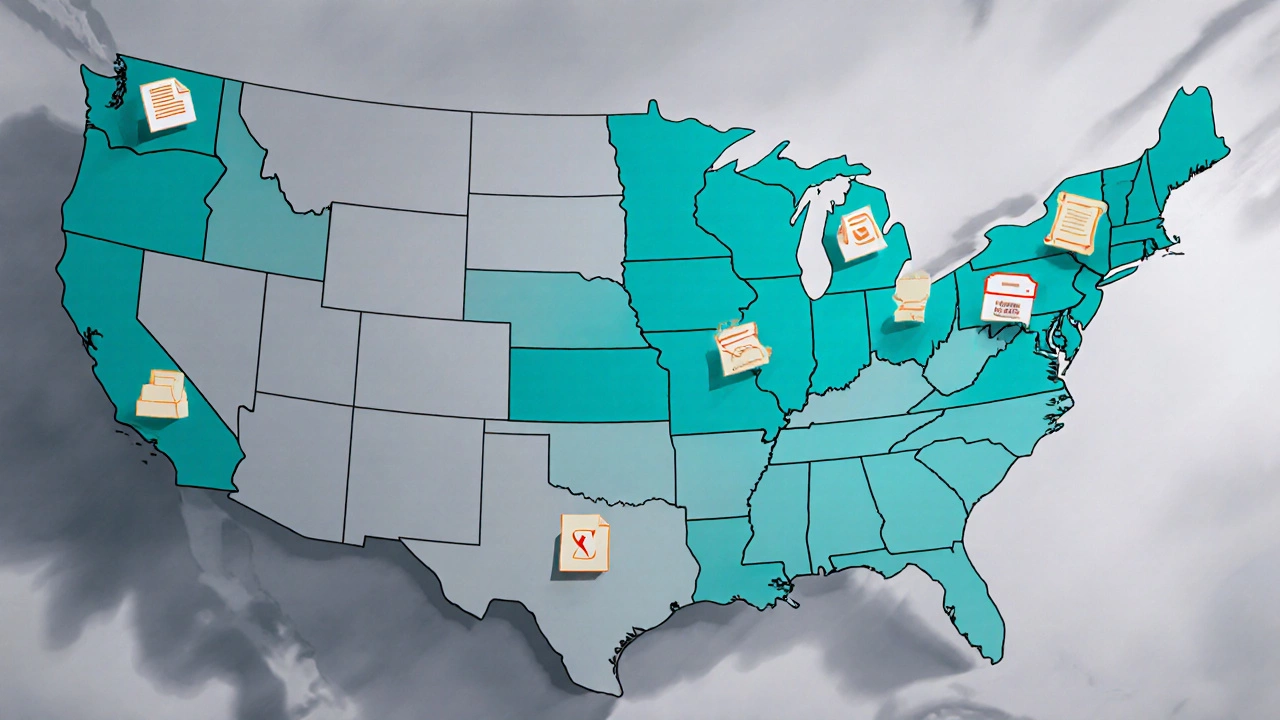Felon-Friendly State Finder
Find Your Best State Match
How This Works
Based on your conviction type and time since conviction, this tool shows which states are most favorable for government employment.
Felon-Friendly State Recommendations
Select your conviction type and time since conviction to see state recommendations
When you’ve got a felony on your record, figuring out where you can actually apply for a government job feels like searching for a needle in a haystack. The good news? Some states have turned the needle into a magnet. Below you’ll find a practical roadmap that shows which U.S. states are the most felon friendly states, what legal tools they offer, and how you can leverage them to qualify for civil service exams, federal positions, and state‑run careers.
What “Felon‑Friendly” Really Means
Felon‑friendly states are jurisdictions that make it easier for people with felony convictions to restore civil rights, seal or expunge their records, and access occupational licenses that are required for many government jobs. The friendliness is measured by four core factors:
- How quickly and broadly a state offers Expungement or record sealing.
- Whether the state automatically restores Voting Rights after sentence completion.
- If the state has adopted Ban the Box policies for state‑run hiring.
- The ease of obtaining a Certificate of Rehabilitation or Civil Rights Restoration for occupations that normally bar felons.
Understanding these levers helps you target the states where a criminal background is less of a career roadblock.
Top Five Felon‑Friendly States (2025 Snapshot)
| State | Expungement / Sealing Eligibility | Voting Rights Restoration | Ban the Box Status | Occupational License Access | Avg. Processing Time |
|---|---|---|---|---|---|
| California | Automatic sealing for non‑violent felonies after 5 years; petition‑based expungement available. | Restored upon completion of sentence, parole, and probation. | State‑wide ban‑the‑box for all public‑sector jobs. | Certificate of Rehabilitation can unlock law‑enforcement, firefighting, and corrections roles. | 2-4 months |
| New York | Automatic record sealing after 10 years of felony‑free conduct; limited expungement for certain offenses. | Rights returned after parole/probation; automatic for most felonies. | Ban‑the‑Box applied to state hiring; local municipalities may differ. | Rehabilitation certificates accepted for public‑service exams. | 1-3 months |
| Illinois | Broad expungement statute (814‑2) allows petition for most felonies after 2‑5 years. | Automatic restoration after sentence completion. | Ban‑the‑Box required for all state‑funded positions. | Certificate of Rehabilitation can qualify for EMT and police academy entry. | 1-2 months |
| Colorado | Sealing available for non‑violent felonies after 5 years; expungement for certain misdemeanors. | Voting restored automatically once parole ends. | Ban‑the‑Box law covers all state agencies. | Rehabilitation certificates accepted for fire‑fighter and correctional officer roles. | 2-3 months |
| Virginia | Expungement for non‑violent felonies after 10 years; automatic sealing for some offenses. | Automatic voting rights return after sentence, including parole. | Ban‑the‑Box adopted for state hires; some local exceptions. | Certificate of Rehabilitation can unblock law‑enforcement and emergency‑services exams. | 3-5 months |
Key Legal Tools You’ll Need
Each state’s friendliest rating hinges on a handful of legal mechanisms. Below is a quick guide to the most common ones and how they impact government‑job eligibility.
- Expungement: A court order that erases the conviction from public view. In felon‑friendly states, expungement often removes the record from background checks used by civil‑service hiring panels.
- Certificate of Rehabilitation: Issued by a state court, this document states that the applicant has been rehabilitated and is fit for public service. It can bypass licensing bans for positions like police officer, firefighter, or correctional officer.
- Civil Rights Restoration: Restores the right to vote, serve on a jury, and hold public office after completion of a sentence. Some states automatically restore these rights; others require a petition.
- Ban the Box: A law that prohibits employers from asking about criminal history on initial job applications. Once a state adopts this, you can get your foot in the door without the stigma of a felony appearing early in the process.
- Occupational Licensing: Certain government jobs (e.g., law enforcement, emergency medical services) require state licenses. Some states allow a rehabilitation certificate to satisfy licensing requirements.

Step‑By‑Step Playbook for Job‑Ready Felons
Follow this checklist to turn a felony record into a qualification for a government career.
- Step 1 - Identify Target State: Use the table above to pick a state whose expungement window matches your conviction timeline.
- Step 2 - Verify Ban‑the‑Box Coverage: Review the state’s civil service website to confirm that the agency you want to work for follows the ban‑the‑box rule.
- Step 3 - Apply for Expungement or Sealing: File the appropriate petition with the local court. Most states provide online forms; attach proof of sentence completion, proof of rehabilitation (e.g., steady employment, community service).
- Step 4 - Secure a Certificate of Rehabilitation: If your target job requires a professional license, request this certificate after expungement. It typically involves a hearing where you demonstrate good moral character.
- Step 5 - Restore Civil Rights: Submit a petition for voting‑rights restoration if the state doesn’t do it automatically. This step is often required for roles that involve voting or jury duty.
- Step 6 - Prepare for the Exam: Enroll in a civil‑service prep course (many community colleges and online platforms offer state‑specific materials). Leverage your rehabilitation certificate as a positive talking point in the supplemental essay.
- Step 7 - Apply: Submit your application under the ban‑the‑box framework. The employer will only see your criminal record after you’re deemed qualified based on skills and test scores.
- Step 8 - Interview & Disclosure: If you reach the interview stage, be ready to discuss your record honestly and highlight the steps you took to rehabilitate.
Skipping any of these steps can stall the process, especially in states with tighter restrictions.
Common Pitfalls and How to Avoid Them
Even in the most welcoming states, applicants run into avoidable mistakes.
- Assuming Automatic Expungement: Not every felony qualifies. Double‑check the list of eligible offenses on the state’s judicial website.
- Missing Deadlines for Rights Restoration: Some states require a petition within a set period after parole ends. Late filings often incur extra fees.
- Failing to Document Rehabilitation: Courts look for tangible evidence-employment records, letters from employers, community‑service logs. Gather these before your hearing.
- Overlooking Local Agency Policies: Even if the state has a ban‑the‑box law, individual agencies (e.g., sheriff’s departments) may have extra screening steps.
- Neglecting Federal Background Checks: Federal positions run a separate background check (e.g., FBI fingerprint). A state expungement won’t hide a felony from the federal system unless you have a full pardon.

Resources You Can Use Right Now
Below are free or low‑cost tools that simplify each part of the process.
- U.S. Department of Labor - Offers a searchable database of state labor laws, including ban‑the‑box statutes.
- National Association of Criminal Defense Lawyers (NACDL) - Provides state‑by‑state expungement guides (PDFs).
- Criminal Justice Reform Act - Federal legislation that influences state policies; useful for understanding broader trends.
- State court self‑help portals - Most state judiciary websites have step‑by‑step wizard for filing expungement petitions.
- Local re‑entry nonprofits - Organizations like the Fortune Society (NY) or the Center for Employment Opportunities (CO) can assist with paperwork and job placement.
Next Steps After You Secure Eligibility
Once your record is cleared or you have a rehabilitation certificate, treat the job hunt like any other civil‑service pursuit.
- Enroll in a state‑specific exam prep course (e.g., the “California State Civil Service Exam Prep”).
- Create a resume that emphasizes public‑service experience, volunteer work, and any certifications earned during rehabilitation.
- Network through community‑service groups; many agencies hold open houses for re‑entry candidates.
- Stay updated on policy changes-states frequently amend expungement windows or ban‑the‑box scope.
With the right state and the proper legal tools, a felony no longer has to be a career dead‑end.
Which state offers the fastest expungement process?
Illinois typically processes expungement petitions in 1-2 months, making it the quickest among the top five felon‑friendly states.
Do I need a Certificate of Rehabilitation for a federal government job?
Federal jobs rely on an FBI background check. A state certificate does not replace a federal clearance, but it can strengthen your case during the discretionary review stage.
Can I apply for a police academy if I have a felony?
Yes, in states like California and New York, a Certificate of Rehabilitation can make you eligible for the academy, provided the felony is non‑violent and the certificate is approved by the hiring agency.
Is ban‑the‑box mandatory for all government agencies?
Most states require the policy for state‑funded positions, but individual agencies (especially law‑enforcement) may retain extra screening steps. Always verify the agency’s specific hiring guidelines.
How often do states update their expungement laws?
Legislative sessions can bring changes every 1-3 years. Subscribe to the state court’s newsletter or follow the NACDL updates to stay current.
